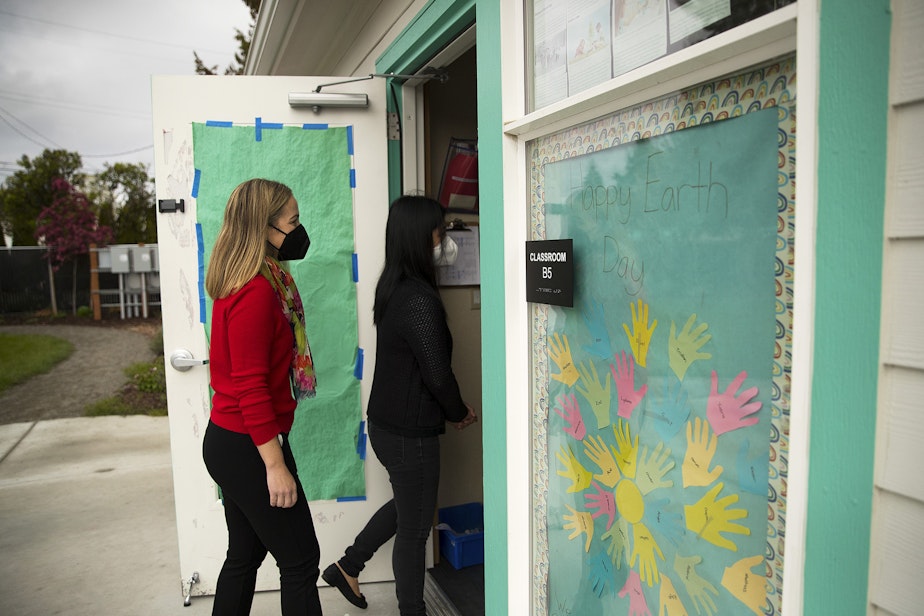WA charter school under audit for 'improper receipt' of state funding

The state’s charter school oversight agency said Impact Public Schools improperly received approximately $790,000 in state funds when it enrolled more than 60 four-year-olds in kindergarten.
The agency referred the matter to the State Auditor’s Office for investigation.
In Washington state, children must be 5 years old by Aug. 31 to start kindergarten in the fall. But Impact, the state’s largest charter-school chain, claimed it was within its rights to enroll underage children as “early entrance” kindergarteners after the state barred it from opening a planned pre-kindergarten program in fall 2020 at Salish Sea Elementary, then based in Tukwila.
The way the school switched these students’ enrollment to kindergarten ran afoul of state charter-school rules, according to a court ruling and the state Charter School Commission.
Impact declined to comment for this story. Charter School Commission Interim Executive Director Jessica de Barros said an interview was not possible given ongoing litigation between Impact and the commission.
Impact had originally asked the commission in early 2020 for permission to create a transitional kindergarten program, state-funded pre-k for children who lack high-quality early learning opportunities, or who are determined to lack the skills needed for kindergarten. However, the commission voted that transitional kindergarten, which the state first approved in 2019, could begin no earlier than 2021 in the charter schools it oversees.
The commission decided it needed more time to develop evaluation measures and regulations for transitional kindergarten, as well as to resolve a legal conflict: To qualify for state transitional kindergarten funding, students must first be assessed to show need. However, state law bars charter schools from that kind of screening prior to enrollment in order to prevent charters from selecting higher-achieving students.
Sponsored
Impact must wait, the commission decided.
Five months later, in fall 2020, state officials discovered that Impact had enrolled 4-year-olds anyway, as “early entrance” kindergarteners. Typically, early kindergarten entrance is reserved for children who are just shy of age 5, or who are deemed sufficiently academically and socially advanced to start elementary school early.
Impact said it had screened the children already enrolled in its planned transitional kindergarten program for kindergarten readiness and had found them all able to skip straight to kindergarten.
That argument fell flat with the commission.
“A student cannot meet both the criteria for [transitional kindergarten] and for early entrance kindergarten,” wrote Joshua Halsey, then-executive director of the commission, in a regulatory letter to Impact Public Schools in February 2021.
Sponsored
The commission ordered Impact to provide an accounting of public funds that went toward the four-year-old kindergarteners, and referred the case to the State Auditor’s Office, which is currently investigating the matter.
Impact challenged the commission’s order in court, claiming that it was within its rights to enroll the four-year-olds in kindergarten after the commission would not allow transitional kindergarten that fall. It did so in an effort to maintain its commitment to the families whose students it had already enrolled, wrote Impact attorneys Christopher H. Howard and David F. Stearns in a legal brief this spring.
Washington’s charter-school law was meant to give charters flexibility to innovate to improve student outcomes, Howard and Stearns argued.
“That is only possible, however, if charter schools are not threatened with having to pay back hundreds of thousands of dollars for offering innovative, in-demand programs in the communities they serve,” they wrote in legal filings.
Thurston County Superior Court Judge Mary Sue Wilson rejected that argument in an April ruling and said that, by screening the 4-year-olds for kindergarten readiness, Impact had clearly violated the charter-school law and its contractual prohibition on pre-enrollment screening.
Sponsored
Wilson affirmed her decision in May after Impact filed for reconsideration.
Impact has appealed the ruling.
Correction, 1:07 p.m., 7/13/22: An earlier version of this story and headline quoted and reported on a draft Washington State Charter School Commission corrective action plan. The commission later issued a final report that revised the draft and removed a reference to “misappropriation” of public funds that must be repaid. The commission’s final report cites “improper receipt” of the funds, and referred the matter to the State Auditor’s Office for investigation, which could result in repayment to the state.




